Ivan Franko
Ivan Franko (Aug 27, 1856 – May 28, 1916) – great Ukrainian writer, one of the architects of the new Ukrainian nation.
Ivan Franko was born in the village Naguevichi (now Drogobych district, Lviv region) in a family in rural blacksmith. He grew up an orphan (in 1865 his father died – Ivan was nine years old, his mother died in 1872). Despite the physical hardships of the family, Ivan studied: in 1862 – 64 years – at a school in the neighboring village Yasenytsya-Sil'na, in 1864 – in 1867 – at an elementary school in Drogobych, 1867 – 1875 – at the school in the same Drogobych.
In 1875, Franko received a scholarship from the Glowacky's fund and in fall of that year enrolled in the philological department of the Lviv University. The scholarship was given until the end of higher education, and it seemed to capable young man creeping smooth road to high school teacher or a professor at the university, for which counted his family and friends.
But in the early university years became self-determination of Franko as Ukrainian figure also clearly progressive, socialist direction. He became a companion of Ostap Terlecky and Michael Pavlik, because the latter tying correspondence with Michael Dragomanov, who at that time stayed in Geneva. Because of this correspondence with revolutionary socialist Dragomanov (dangerous in the eyes of the police) Franko was arrested (11 Jun 1877). He, along with fellow accused in the formation of a secret socialist society. 21 Jan 1878 the court found him guilty and sentenced to 6 weeks imprisonment. Since then the term of investigative detention not reckoned to punishment, Franko had been released to freedom March 5, 1878.
Despite the short period of punishment (thanks comrade Stalin any imprisonment less than 10 years we now believe easy), its consequences for Franko were terrible. First, under the law a person with criminal record could not become a teacher, so the goal of training at the university became unclear (besides Franko took away a scholarship). Second, while in custody Franko hard cold; later this disease has become chronic and haunted him all his life. Thirdly, the priest Michael Roshkevych (father Olga Roshkevych, Franko's bride) refused Franko in his matchmaking and even forbade his daughter from seeing and corresponding to the "criminal". Their marriage did not take place.
That's meant to be Ukrainian figure in the then Galicia!
This police pursuit Franko did not end there. 4 Mar 1880 he was arrested in Kolomyja – again on suspicion of socialist agitation. For three months he was held in pretrial arrest until acknowledged that the arrest was unreasonable. 13 Jun 1880 Franko was sent under escort from Kolomyja to Naguevichi. Impressions from this imprisonment formed the basis of the story "At the bottom".
The third time the police thought of "socialist agitator" Franko in connection with the arrival in Lviv group of Kyiv Ukrainians. 17 Aug 1889 Franko was arrested in Lviv. At this time, investigators have tried to associate socialism with spying for Russia. 16 Nov 1889 Franko was released for lack of evidence. And this time the prison experiences found reflection in the poetic cycle "".
In 1886, Franko married Olga Khoruzhynska (originally from Kyiv). In their family appeared four children, but since 1902 a family well-being began to collapse. Olga Franko had shown signs of a mental disorder that was increasingly strengthened, and it brought a lot of grief to Ivan Franko.
In 1902 Franko moved from hired apartment to own house (present address – I. Franko street, 152, where is museum of the writer). For this construction he took a considerable loan payment for which was completed by his son after the death of Ivan Franko.
In April 1908 Franko went to rest and treatment to Lipik (near Zagreb in today Croatia). Here he was greatly exacerbated disease – were paralyzed with both hands and, worse, there are signs of a mental disorder. These terrible symptoms of the disease in later years, fortunately, somewhat softened, but Franko's health never returned. His contemporaries regarded him as the result of disease endured ever syphilis, that causing very large grief for Franko. But now doctors are inclined to think that Franko from the imprisonment in 1877 suffered from a rare form of rheumatism (Reiter's syndrome, but the concept of this syndrome was formulated away after the death of Franko).
Exhausted with diseases, lack of money, family and community dislocations, Franko died in his home in Lviv 28 May 1916 and was buried at the Lychakiv cemetery.
Poet. Franko made his debut as a poet in 1874 and wrote poetry until the end of his life, 1916. In his poetic heritage – many beautiful verses about personal experiences and public affairs, which amounted to several books.
But most powerfully Franko's poetic talent manifested in the great poems. Here we see a realistic picture of contemporary Galician life ("", 1884; "", 1889; "", 1890), images of the past of our people ("", 1887; "", 1895; "", 1900), arguments about religion and God ("", 1885; "", 1889).
A great place among Franko's poems occupy recycling stories of world literature ("", 1890; "", 1891; "", 1892; "", 1895; "", 1900; etc.).
The peak poetry of Franko is the poem "" (1905), in which on the base of biblical story created allegorical picture of the rise of the Ukrainian people in the struggle for independence.
Prosaist. In his prose works Franko acted as a realist, focused on the problems of contemporary Galician life. He was the first in Ukrainian literature began to describe the life of workers at Borislav oil fields and their class antagonists – Jewish entrepreneurs ("", 1877; "" 1884; "", 1887; "", 1899). The best piece in this series is the novel "" (1882).
Important place have the works about life of intellectuals ("", 1880; "", 1897; "", 1900). An important role in this series take pieces of Ukrainian-Polish relations ("", 1887; "", 1894; unfortunately, both works remained unfinished).
Translator. On translations of world literature Franko worked all his life and made in this field very much. One can create a whole library of his translations.
The range of his translations is extremely wide: there are works of ancient Babylonian poetry, ancient Indian, ancient Arab, ancient Greek literature; from new literatures are translations from German ("Faust" by J. W. Goethe, 1882), French, English, Polish, Italian literature.
Among his translations – entire books of works by A. S. Pushkin, K. Havlicek-Borovsky. Separately, it should be noted the great from historians of ancient Rome, on which the poet worked in the last year of his life (August 1915 – March 1916).
Please be aware that Franko translated as Ukrainian folk songs in German, helped M. S. Hrushevsky with German translation of "History of Ukraine-Rus'". He translated not only fiction, but also popular scientific works of various themes (in 1870's and 80's), which he considered useful for the education of the Ukrainian people.
Folklorist. Interest in folklore Franko showed from the very beginning of his creative activity. The first publication of folk tale in his record appeared in 1876, His most important achievements in this field were "" (1901 – 1910, vols. 1 – 3) and "Studies of Ukrainian folk songs" (1907 – 1915 years).
Franko has published a large number of smaller folkloristic and ethnographic studies and records, recorded a large number of folk songs. Several folk songs with singing Franko (1901).
The historian of literature. Over the history of literature Franko worked in several directions.
The first direction may be called the history of world literature stories. The greatest achievement in this regard was his doctoral thesis ": old christian spiritual novel and its literary history" (1895).
The second direction was the collection, study and publication of works of Ukrainian literature. The main focus here is the collection "Apocrypha and legends of Ukrainian manuscripts" (1896 – 1910, vols. 1 – 5). Franko sought out and published the works of Ivan Vyshensky and wrote about him a number of studies. He has prepared and published works by A.Svydnytsky, Ju. Fedkovych, T.Shevchenko and many other Ukrainian writers.
The third direction was writing synthetic works on the history of Ukrainian literature. One should mention such works as "" (1892), "Karpato-Ukrainian literature 17 – 18 cent." (1900), "The south-russian literature" (1904 – article for encyclopedia Brockhaus and Efron), "Outline of the history of Ukrainian-Ruthenian literature until 1890" (1910) and great work "History of Ukrainian Literature", from which Franko had to process only the first part (from the beginning of Ukrainian literature to Ivan Kotliarevsky, 1907 – 1912).
Please be aware that Franko closely followed the innovations of contemporary literature, especially Ukrainian, had written a lot of reviews, comments and critiques on these topics.
Scientist. In addition to the history of literature, Franko worked in other humanities. His interest in history reflected in the works "" (1884), "Grymaliv district in 1800" (1900), "Public barns in Galicia 1784 – 1840" (1907) and a number of smaller items. He also interested in sociological questions.
Franko led the considerable scientific and organizational work as head of the philological section of the Shevchenko scientific society and editor of publications of this section.
Publisher. Franko's first works were published in Lviv student magazine "Friend" in 1874. While moved to Lviv, Franko along with Pavlik got involved in editorial work and in 1876 – 1877 years been the de facto leaders of this journal.
Since then Franko constantly scurried plans publishing own magazine or newspaper; so, in 1878, Franko with Pavlik was able to release two issues of the magazine "Public friend", which were confiscated by police. Then in 1878 – 1880 friends published a book in the series "Small library". Later Franko participated in the journals "World" (1881 – 82), "Dawn" (1883 – 1886), the newspaper "Work" (1880, 1883 – 1885), "Kurier lwowski" (1887 – 1897, this latest work of Franko himself called "Hiring the neighbors ").
In 1894 Franko's dream has finally come true – started publishing his own magazine "Life and word". This magazine had considerable help from the Dnieper Ukraine as money (through M. Kovalevsky) and literary (articles for publication).
At the end of 1897 guidance of the Shevchenko Scientific Society (led by M. Hrushevsky) decided instead journals "Dawn" and "Life and word" begin in 1898 to publish a new magazine – "Literary Scientific Herald". Franko became a member of its editorial board and was active there until the end of 1906.
Simultaneously, in 1898, was created "Ukrainian-Ruthenian publishing association", in which Franko was active until the beginning of his illness.
Social activist. In 1870-s political Ukrainians in Galicia was presented by Moscowphiles who thought that the sun of happiness will come up to the north, in St. Petersburg, and populists who hoped its rise in the west, in Vienna. Both groups opposed the Polish community, which, after a constitutional reform in 1867, took up more and more influence in the province.
In 1890 the young Galician intellectuals founded the Ruthenian-Ukrainian Radical Party, led by Ivan Franko until 1898. This was party of socialist orientation, which sought to become representation of wider range of workers.
In 1895, Franko was the candidate of the Radical Party for Ambassador to Vienna parliament constituency in district Przemysl – Dobromyl – Mostyska. In 1898, he was also a candidate for the district Ternopil – Zbarazh – Skalat. Both times against Franko was put all the means of "democratic" influence: from arrests agitators and bans of meetings to daring steal votes, so that Franko was not elected.
In 1899, Franko came out the Radical Party founded by him and became one of the organizers of the new Ukrainian National Democratic Party. The move did not brought good for either radicals who lost influential figure, or national Democrats, who have not won a major political impact, or very Franko, which is not marked by activity in the new party and gradually withdrew from political struggle, focusing on literary and scientific work.
Due to the interest in the political life and subsequent personal participation therein Franko has written many publicistic articles, among which plays a significant reflection on socialism and social democracy. Through a Franko's critical attitude towards the communist gods of Marx and Engels his journalism has undergone tampering and concealment in times of communist domination of Moscow.
Ivan Franko vocation was a poet, writer; but in the subjugation of the Ukrainian people, he could not afford to be just a writer – he willingly and resolutely took up any job, which he regarded as useful for raising the Ukrainian people. Because of this, many of his literary plans remained unfulfilled, to which he bitterly complained of some poems. But his universality in operations allows us to say that in the face of Ivan Franko, we have not only a great writer, but also one of the architects of the Ukrainian nation.
M. Zh., May 31, 2014



